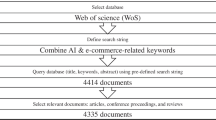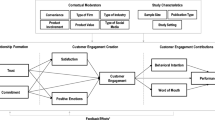Abstract
Electronic communities are social aggregations of critical masses of people on the Internet who engage in public discussions, interactions, and information exchanges with sufficient human feeling on matters of common interest to form webs of personal relationships. Many such e-communities are rapidly evolving on the Internet, some initiated, organized, and controlled by community members themselves, some organized and controlled by marketers, and some by third parties acting as intermediaries between members and other interest groups such as marketers and advertisers. In this paper, we explore the role of e-communities as intermediaries in exchange relationships among community members and between community members and other interest groups such as marketers and advertisers from an economic perspective. In particular, we focus on the types of interactions that take place among community members and between community members and other interest groups and examine the economic and social issues involved in maintaining a healthy community. Deriving parallels from extant research in financial intermediation and social exchange theory, we explore conditions and incentive mechanisms under which such communities could develop and add value on the Internet. We also draw upon limited empirical examples from the World Wide Web to provide support to our propositions.
Similar content being viewed by others
References
Armstrong A, John H. III. The real value of online communities, Harvard Business Review 1995;74(3):134–140.
Barnett T. The critical role of information exchange in marketing relationships. Ph.d. dissertation proposal, Duke University, 1999.
Bhattacharya S, Thakor AV. Contemporary banking theory, Journal of Financial Intermediation 1993;3:2–50.
Chang A, Kannan PK, Whinston A. The economics of freebies in exchange for consumer information on the Internet: An exploratory study, International Journal of Electronic Commerce 1999a;4(1):85–102.
Chang A, Kannan PK, Whinston A. Business models for freebies in exchange for consumer information on the Internet: A comparative study, Working Paper. University of Maryland, College Park, MD 20742 1999b.
Choi S-Y, Stahl D, Whinston AB. The Economics of Electronic Commerce. Indianapolis, IN: Macmillan Technical Publishing, 1997.
Diamond D. Financial intermediation and delegated monitoring. Review of Economic Studies 1984;51:393–414.
Diamond D. Financial intermediation as delegated monitoring: A simple example. Federal Reserve Bank of Richmond Economic Quarterly 1996;82(3):51–66.
Friestad M, Wright P. The persuasion knowledge model: How people cope with persuasion attempts. Journal of Consumer Research 1994;21:1–31.
Kannan PK, Chang A, Whinston AB. Marketing information on the I-way. Communications of the ACM 1998;40(3):41–48.
Rheingold H. The Virtual Community: Homesteading on the Electronic Frontier. NewYork: Harper Perennial Publishers 1993.
Scanzoni J. Social Exchange and Behavioral Interdependence. In: R. L. Burgess and T. L. Huston (Eds.), Social Exchange in Developing Relationships. New York: Academic Press, 1979.
Author information
Authors and Affiliations
Rights and permissions
About this article
Cite this article
Kannan, P.K., Chang, AM. & Whinston, A.B. Electronic Communities in E-Business: Their Role and Issues. Information Systems Frontiers 1, 415–426 (2000). https://doi.org/10.1023/A:1010022226639
Issue Date:
DOI: https://doi.org/10.1023/A:1010022226639




